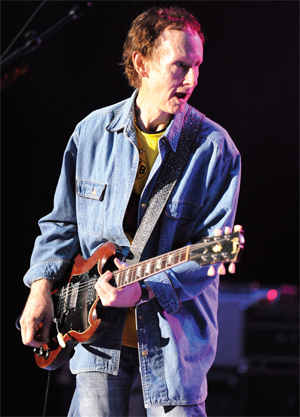Robby Krieger: Miles High Club

Originally published in Guitar World, October 2010
Robby Krieger’s tells how his love of Miles Davis inspired his new album, Singularity.
GUITAR WORLDSingularity is your first solo recording in 10 years and it is quite different from your previous efforts. What was the origin of these songs?
ROBBY KRIEGER About 15 years ago, I started working on a tribute to Miles Davis’ Sketches of Spain with Arthur Barrow, the bassist from Frank Zappa’s band. It involved flamenco guitar work and orchestration. We started to record it, but the project got bogged down, and we gave up. Then a couple of years ago, I found the tapes and realized we had the start of something really good, and little by little we started replacing all the original MIDI instruments with the real stuff. The first thing we recorded was the drums, which was really difficult, because in the first piece on the album—“Russian Caravan”—there are probably 10 time changes. Vinnie Colaiuta, who Arthur played with in Zappa’s band, was the only guy we could think of who could do it, and he nailed it in two takes. After that, we were off and running.
GW How do you think the recording would have been different had you completed it 15 years ago?
KRIEGER Not as good. I think the end result is a lot better than we ever imagined it being. We never really thought we would actually do it. It was more or less just an exercise and something fun to work on, inspired by our love for Miles Davis. If we had known then how it would turn out, I don’t think we would have believed it.
GW Several songs on Singularity have extended solo flamenco intros, which is fascinating to Doors fans that know your background. Is it more satisfying for you to play flamenco today, now that you’ve built up the skill for it?
Get The Pick Newsletter
All the latest guitar news, interviews, lessons, reviews, deals and more, direct to your inbox!
KRIEGER Yes. I hadn’t played flamenco for years, so I had a long way to go. I practiced very seriously for about six months before I felt I was able to play that stuff well enough. I knew I was ready when I heard something I had recorded two weeks earlier and mistook it for a real flamenco player I had been stealing licks from.
GW It must have felt nice to complete the circle like that.
KRIEGER Yeah, definitely. I really missed playing flamenco and had been getting back to it little by little. Ray [Manzarek, Doors keyboardist] and I started doing “Spanish Caravan” during our Doors shows, and I would perform a longer and longer intro to it as I got more comfortable with the technique and better at it. What I play now is quite similar to what I recorded on “Russian Caravan,” the intro to the first track on the new CD.
GW You’ve improved as a guitar player since the days when you cut the original Doors recordings. Now when I hear you play those songs in concert, it sounds as if you’re able to take them to their natural conclusion—to fully execute all the very cool ideas that you laid out in the original versions.
KRIEGER Yeah, exactly, man. Back then, I never practiced in a regimented way or thought about how proficient I was, guitar-wise. As time went on, I did want to get better, but you have to put the time in, and we didn’t have that in the Doors’ heyday. If I knew then what I know now, I definitely would have done some things differently. Then again, when I listen to that old stuff, I recognize that it has something that I probably couldn’t do now. I think I touched some special magic just from being naïve and playing the best I could—from not actually knowing what a Mixolydian scale was.
There’s a fine line between what you want to do in music and what you can do. A lot of guys tell me with great excitement, “Oh I’m going to Berklee School of Music or the Guitar Institute of Technology.” I always respond, “Oh, that’s great, but you have to be careful not to get caught up in being too technical, ’cause that can really mess up your songwriting.”
Songwriting is what connects your music to people. It’s everything. Back in the Doors, discovering a minor chord would excite me, but the public for the most part does not know enough about music to care about something like that. They just want to be moved and drawn in by the music, and when you’re writing songs you have to feel that, too. You can’t lose sight of the wonder of a simple but cool-sounding chord or riff.










